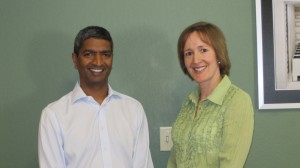By Alison van Diggelen, host of Fresh Dialogues
This is a transcript of Part Two of my interview with Bloom Energy CEO, KR Sridhar. The interview was recorded on September 30, 2009 at the Bloom Energy headquarters in Silicon Valley, California. To listen to the interview and read the original post, click here.
SEE THE VIDEO INTERVIEW WITH KR SRIDHAR HERE – A FRESH DIALOGUES EXCLUSIVE Part One: Fuel Cell Technology and Efficiency
Also Part Two Bloom Energy: Affordability is Essential Video
Part Three Bloom Energy: Mission to Change the World Video
To listen to Part One of the interview, click here, or read the transcript
We join the conversation as we are discussing the pricing of the Bloom Box.
Alison van Diggelen: KR, thank you for joining me today on Fresh Dialogues.
KR Sridhar: You’re welcome.
Alison: I appreciate your taking the time. So let’s talk about how affordable it (the Bloom Box) might be…I’ve read that $10,000 is a target…
KR: Don’t use any numbers.
Alison: Is this all speculation?
KR: That’s all speculation. So all that I can simply tell you is: if it needs mass market adoption, it needs to be affordable. And affordability is already set in the marketplace because today you buy electrons and you pay a certain price. If I offer you all the advantages of the kind of device I’m talking about, and you have to pay the same price you’re paying your local utility, then it’s affordable to you. So that goal is there. Our goal is clearly to make it affordable; if it’s not affordable, it’ll be the niche market, it’ll be a Tesla…
Alison: Right. And your goal is to make it absolutely affordable?
KR: We need it to be a Honda Civic.
Alison: A Honda Civic? I like that analogy. That’s great. Let’s talk about barriers to entry. You’re notoriously in stealth mode. Are there high barriers to entry to this? How many Ph.D.s do you have working on it?
KR: Absolutely – very high barriers to entry. The high barriers to entry come (from) – it’s a very complex interdisciplinary field; it requires knowledge not just in one area, in a significant number of engineering, science, material science disciplines…and the development of all the technology, the process know-how is fairly complex…and a significant amount of capital – and I can’t give you the number – that needs to be invested over a long period of time, to get it to where it needs to be. Those become the barriers to entry. But clearly, it’s a huge enough market that other people will try.
Alison: And how many Ph.D.s do you have on your team, working on this problem?
KR: Let’s say it’s in the hundred range.
Alison: It’s in the hundred? And I assume, this being Silicon Valley, people from around the world.
KR: Around the world.
Alison: You’re getting the best talent on this problem and they’re presumably all sworn to secrecy…
KR: They’re the best in what they do and that’s why they’re here.
Alison: You filed your first patent in 2003 and I understand there was one filed last year?
KR: Mmm-hmm.
Alison: Can you describe the trends from 2003 to now? You’re obviously a very patient man and you’ve talked about your motivations, but can you talk about the whole trajectory? In 2003, when you filed that patent, did you think that by September 2009, you’d be in production?
KR: We’d roughly laid out this timeline in our very first series of fundraising from our investors. For a project of this timescale, we’re probably within two, three quarters of the original projection…and again you need to understand that this is the kind of product that nobody has built before and an industry to support it doesn’t exist…So we’re not just building a company, we’re building all the support infrastructure that needs to be around us. So, given that caveat, if you accept that as the give-or-take, we’re on plan.
Alison: So there must be growing enthusiasm and excitement in this building?
KR: Absolutely. The big thing is the entire Bloom Team, from employees, to investors to board members to everybody else, are real believers in what we do and real believers in the mission of the company. So that alone creates the enthusiasm.
Alison: I bet. You’ve said ‘we want our products to speak before we speak.’ What do you mean by that?
KR: There’s been enough hype of people coming and saying ‘this is what we will do’ …a lot of them have not come to fruition…That doesn’t mean that they did something wrong. It’s just a very difficult problem to solve or somebody would have solved this a long time ago. And for us, we just didn’t want to add to that hype of coming and saying, ‘this is what it’ll do.’
We first wanted to be sure it works…It’s not just that it works, it can be made affordable. It can make a difference. You’re creating a business, you’re creating an industry, so it needs to work, it needs to be a quality product that has reliability, that people will buy. It needs to be the kind of product that makes a difference in somebody’s life to want to buy it. It can be…affordable – there’s a value proposition to it – and at that affordability rate, the business can be successful because it’s making a profit.
Alison: Well KR Sridhar, it’s been a pleasure. Thank you for joining me today on Fresh Dialogues.
KR: Thank you.
For more Fresh Dialogues with KR Sridhar, click here
For more Fresh Dialogues with Venture Capitalist, Vinod Khosla, click here



